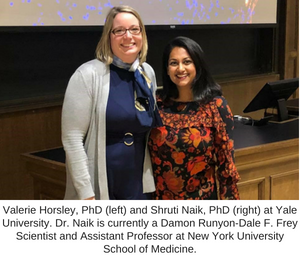By Damon Runyon-Dale F. Frey Scientist Shruti Naik, PhD
“Sorry, I have to take this call… it’s my campaign manager” are not words one expects to hear from a scientist. But Valerie Horsley, PhD, is redefining what it means to be a scientist. Valerie, a tenured professor of Molecular, Cellular, and Developmental Biology at Yale University and a former Damon Runyon Fellow (’04-’07), decided that it was time she stepped up. She recently secured a bid from the Hamden district of Connecticut to run for the upcoming Democratic primary election which will be held next week on August 14th.
Although Valerie has always been a social activist—for postdocs, parents, and women—her formal entry into politics came when she founded and became CEO of Action Together Connecticut. This grassroots organization has over 6,000 members statewide and is focused on engaging Connecticut's citizens to support progressive legislation. In December 2017, Valerie announced her candidacy for State Senate. Her agenda builds on her vast experience as a laboratory head, teacher, mother, citizen, and activist. I am particularly impressed by her plan to stimulate Connecticut’s economy through biotechnology as an example of how science can contribute to society, not just by providing technological advancement, but through job creation.
Greater numbers of scientists are finding themselves at the crossroads between science and politics. In fact, the largest number of scientists in history is running for office now. This election year, more than 60 researchers such as Valerie and 200 others with scientific backgrounds are entering the political arena. Their campaigns are supported by the grassroots political action committee 314 Action. 314, the numerical representation of pi (the ratio of a circle’s circumference to its diameter), was selected because, just like pi, science is entrenched is every aspect of our lives. The committee is focused on electing more scientists to office and improving science communication with the public.
Basic laboratory research frequently comes under political fire for being too esoteric and failing to make voters understand the value of “useless” knowledge. What can we learn from fruit flies? Why are we studying bacterial genetics? What do yeast have to do with cancer? Yet, it is precisely such work that leads to revolutionary breakthroughs and new cures. The push for funding practical and clinical research is necessary to bring existing findings to the clinic. The game-changing discoveries of tomorrow demand long hours at the bench today.
I read a jarring statistic recently that the average American doesn’t know a single scientist. I hope this political cycle, with more scientists running for office, improves that disconnect. Tracing the roots of medical breakthroughs to decades of foundational lab work and making our research accessible to the public is vital for securing the uncertain future of basic research.
In time, science might garner more public support through the election of politicians who understand the importance of research for the benefit of society. By stepping into the public arena, courageous scientists like Valerie Horsley will increase visibility for this cause and leverage biomedical research and technology to improve their communities, bringing about much needed social and economic change.
Find out more about Valerie’s campaign here .







